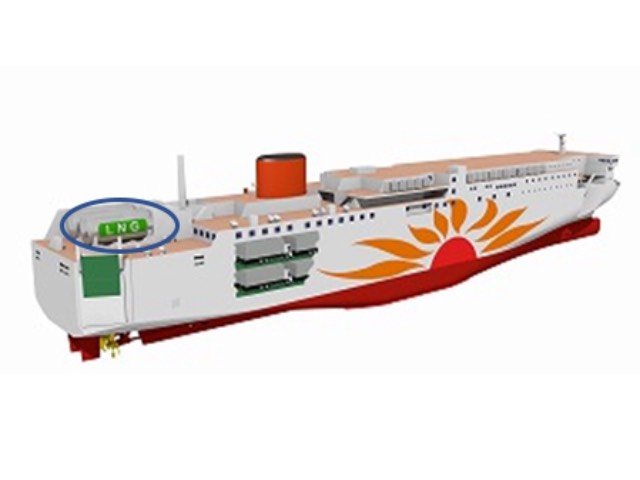Large Ferries Reduce Environmental Impact with Cutting-edge Technology and Compliance with Modal Shift, While Inheriting a Proud Tradition of Service
Mitsui O.S.K. Lines, Ltd. (MOL; President & CEO: Junichiro Ikeda) and its group company Ferry Sunflower Limited (President: Mitsujiro Akasaka; Head Office: Oita-shi, Oita Prefecture) today announced plans to construct the first two LNG-fueled ferries in Japan, the Sunflower Kurenai and the Sunflower Murasaki (Vessel names are tentative).
MOL plans to order the vessels from Mitsubishi Shipbuilding Co., Ltd. (President: Koji Okura; headquarters: Nishi-ku, Yokohama-shi) in December. Ferry Sunflower will charter the ferries after delivery and launch them on its Osaka-Beppu route from the end of 2022 through the first half of 2023, as replacements for vessels currently in service (Note 1).
Reduced environmental impact
The ferries will be equipped with high-performance dual fuel engines (Note 2) and will provide passengers with comfortable accommodations and reliable schedules. What’s more, they will be quieter than current vessels, ensuring smoother, more relaxing travel. The use of LNG fuel will achieve excellent environmental performance, reducing carbon dioxide (CO2) emissions by 20% compared to current vessels, and virtually eliminating sulfur oxides emissions.
Compliance with Modal Shift
Please refer to the comparison between the Sunflower Ivory and the Sunflower Cobalt currently in service.

Inheriting a Proud Tradition of Service
The new vessels’ names are derived from the Kurenai Maru and Murasaki Maru, which MOL’s corporate forerunner Osaka Shosen Kaisha launched on the Osaka-Beppu route in the 1910s. These vessels, and others that carried the same names, were called “Queen of the Sea” and the “Queen of the Seto Inland Sea.” The new ferries will feature with amenities worthy of the tradition they inherit on the Osaka-Beppu route, which has a proud history of more than 100 years, and further expand the “casual cruise concept” (Note 3).
The ferries also embody the environmental impact-reducing ferry (ISHIN-Ⅱ), which was planned as a part of the “ISHIN NEXT – MOL SMART SHIP PROJECT” (Note 4). MOL is developing the technology for LNG-fueled vessels and establishing safe operation through development, construction, and operation these new ferries, and promoting the wider use of LNG fuel (Note 5). The MOL Group continually promotes and develops its environmental and emission-free business, striving to reduce the environmental impact of its business activities.
The project has been adopted for the FY2019 energy conservation rating system for coastal ships, a demonstration test program aimed at enhancing the operational efficiency of coastal ships backed by Japan’s Ministry of Economy, Trade and Industry and Ministry of Land, Infrastructure, Transport and Tourism.









































